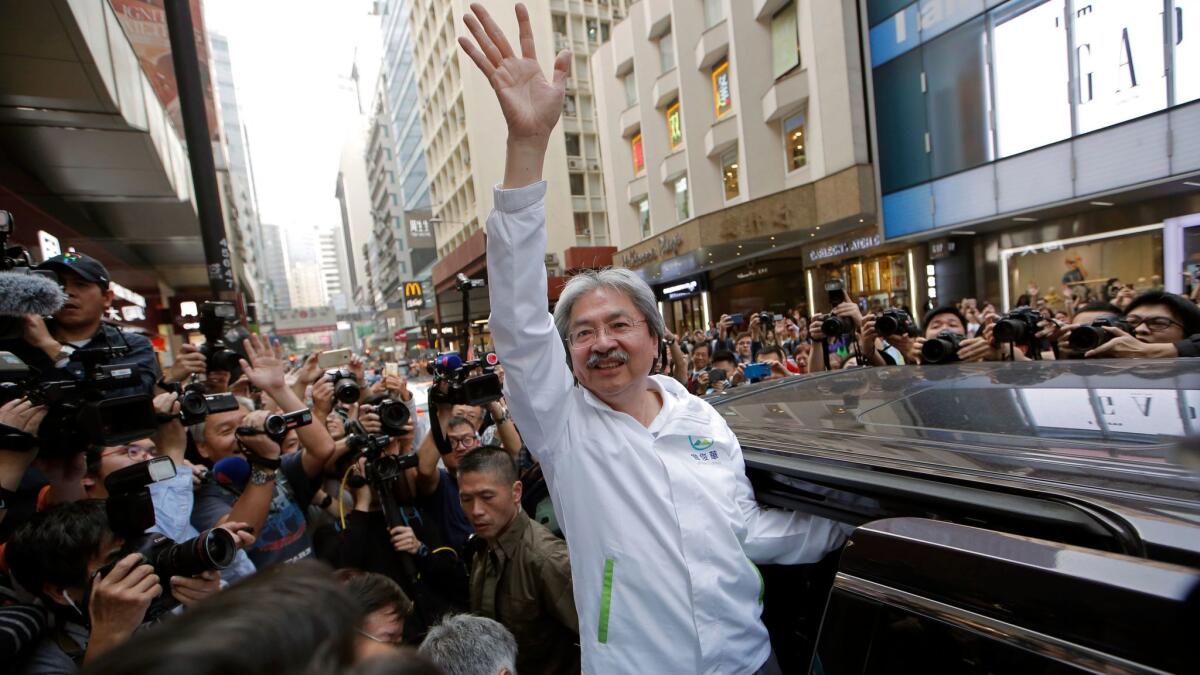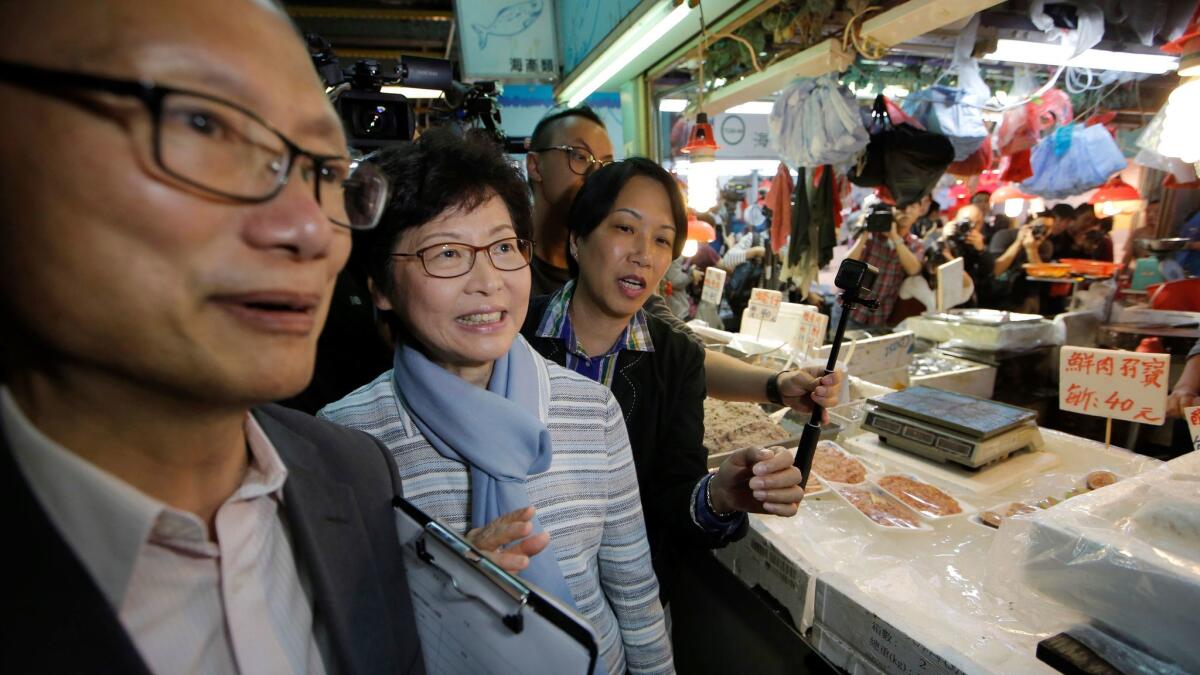Hong Kong relives its failed push for greater democracy as leadership election nears

- Share via
Reporting from HONG KONG — This Asian financial hub once promised professional ascent as steep as its alleyway stairs.
But spiraling property prices in Hong Kong are pushing people from their homes, a widening wealth gap feeds divides and Beijing’s tightening grasp sends tremors through the city.
The upcoming chief executive election — the first for a top leader since massive 2014 protests — accentuates the fractured state of Hong Kong’s political system. Thousands of young residents camped out in the streets for the right to choose their own leader. Sunday’s elections are a stinging reminder of their failure.
“The overwhelming sensation is one of resignation,” said Jason Y. Ng, a Hong Kong lawyer who has written a book about the Umbrella Movement protests. “All we can do is watch and wait for the future of our city to be decided for us.”
A 1,194-member election committee of business and political elites, many of whom are pro-Beijing, will determine the leader for a city of 7.3 million people.
The establishment group favors Carrie Lam, 59, the city’s reserved, former No. 2 official, who locals believe has Beijing’s backing. Her biggest threat comes from ex-colleague John Tsang, 65, an affable former finance secretary who has amassed more popular support. Retired judge Woo Kwok-hing, 71, is the outlier candidate.
Few campaign signs cover Hong Kong’s dense maze of buildings or peek from apartment windows. Lam has kept a lower profile, making occasional marketplace visits and offering promises of unity in a newspaper ad. But Tsang is betting on the influence of the public, and on Friday, he drove around the city in an open double-decker boss taking selfies with the crowds. Hundreds appeared at his Friday night rally downtown.
His fans refer to him in Cantonese as “potato-chip uncle,” after the mustache he sports that resembles Julius Pringles, the chip mascot.
Tsang leads Lam by more than 17 percentage points, according to a Chinese University of Hong Kong poll. Public opinion only goes so far. About two-thirds still believe she will win.
The central government legally appoints the winner, which means Beijing has the ultimate decision. If Chinese officials veto a Tsang victory, they face backlash from a society already on edge.
Chinese leaders “don’t want him to win because they don’t want to have to say no,” said David Zweig, director of the Center on China’s Transnational Relations at the Hong Kong University of Science and Technology. “Beijing wants to ensure a tougher person in control, and that is Carrie.”
The election occurs before the July 1 anniversary when, two decades ago, British officials took down their flag and returned the former colony to China.
Beijing controls the city under a framework known as “one country, two systems.” This grants it civil liberties restricted on the mainland, such as an uncensored Internet and a free press.
The setup lasts until 2047, but Hong Kong citizens worry their freedoms already are eroding. Two years ago, five booksellers who sold salacious material about China’s leaders were reportedly snatched by mainland authorities. Last fall, the Chinese government intervened in Hong Kong’s legislature, effectively barring two pro-independence lawmakers after they inserted derogatory references to China in their oaths.
Officials said the decision reflected the will of the Chinese people and did not violate residents’ rights.
“Beijing wants to demonstrate there is a choice and Hong Kong’s ‘one country, two systems’ is working well … in spite of the limitations we all know,” said Jean-Pierre Cabestan, a professor of Chinese politics at Hong Kong Baptist University. “That’s why this election is rather significant.”
Lam and Tsang declined interview requests.
These are the second votes since the protests. The first, legislative elections last fall, saw gains for a budding independence movement. That worries Beijing. Premier Li Keqiang stood in front of China’s parliament this month and warned Hong Kong independence would “go nowhere.”
Mainland leaders want to avoid any ripples ahead of a twice-a-decade leadership transition this fall. Several election committee members told local media they received phone calls from people tied to the Chinese government encouraging them to vote for Lam.
Popularity certainly is important, but maintaining a good working relationship with the central government is crucial.
— Li Kashing, Hong Kong’s richest man
Beijing’s representative office in Hong Kong has denied interference.
Residents distrust Lam because of her association with C.Y. Leung, the unpopular current chief executive, and the belief that Beijing appointed her to the role. Supporters insist she will provide the stability the city needs.
“Popularity certainly is important, but maintaining a good working relationship with the central government is crucial,” Li Kashing, Hong Kong’s richest man, told reporters Thursday. He didn’t mention Lam’s name but pledged to vote for the candidate trusted by Beijing, an implicit endorsement.
Tsang’s backers like him for the opposite reason.
“He cares about us,” said Candy Poon, 32, a banker who stood near a cutout poster of Tsang shaking hands at the Friday rally. “There’s no comparison.”
Hong Kong has never been fully democratic, and only a small group of people desires independence. A larger contingent simply would like their current opportunities to improve.
“What Hong Kong people want is election rather than selection,” said Joshua Wong, a prominent student activist in the protests.
Wong, who now leads the pro-democracy party Demosisto, doubts either government employee would make much difference.
He and others plan to protest in front of the main voting station, the city convention center overlooking the harbor. “We will keep on persisting,” he said.
Some local artists have asked residents to broadcast on social media their activities on Sunday, from brushing teeth to buying egg tarts. They aim to show how few people in the city can actually vote, unable to participate in the political process.
More than 60,000 citizens already hiked to polling stations or went online to participate in a mock election, launched by pro-democracy groups. Tsang was the clear winner.
This public response “reveals the drastic change in the political sentiment in Hong Kong after the Umbrella Movement,” organizer Citizens United in Action, said in a statement. “It is imperative for us to grasp such changes in order to keep the democratic movement in Hong Kong going.”
But many residents have stopped paying attention to something they feel unable to influence.
Chan Chi-him, 71, runs a shoe box-sized shop in west Hong Kong on a street with dried fish and ginseng. His father started the company when the British controlled the city.
He barely looked up from his careful scrubbing of edible bird nests, a Chinese medicinal treatment.
The election “doesn’t matter,” he said. “We don’t have the right to vote.”

Meyers is a special correspondent. Nicole Liu in The Times’ Beijing bureau contributed to this report.
More to Read
Sign up for Essential California
The most important California stories and recommendations in your inbox every morning.
You may occasionally receive promotional content from the Los Angeles Times.










